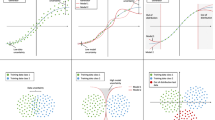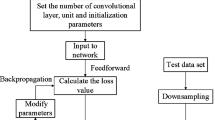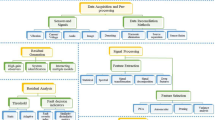Abstract
Many recent data-driven studies have used sensor profile data for prognostics and health management (PHM). However, existing data-driven PHM techniques are vulnerable to three types of uncertainty: sensor noise inherent to the sensor profile data, uncertainty regarding the current health status diagnosis caused by monitoring a single health index (HI), and uncertainty in predicting the remaining useful life (RUL), which is affected by unpredictable changes in system operating conditions and the future external environment. This study proposes a deep conditional health index extraction network (DCHIEN) for PHM to effectively manage these three types of uncertainty. DCHIEN is a model that combines a stacked denoising autoencoder that extracts high-level features robust to sensor noise with a feed-forward neural network that produces an HI based on user-defined monitoring conditions. This approach supports system health monitoring using the conditional HI, as well as prognostics using RUL interval predictions. Extensive experiments were conducted using NASA’s turbofan engine degradation dataset. The results show that the proposed method achieves a superior RUL prediction performance compared to state-of-the-art methods and that uncertainties can be effectively managed.




Similar content being viewed by others
Data availability
The datasets generated during and/or analyzed during the current study are available at https://www.kaggle.com/code/phamvanvung/cmapss.
References
Benkedjouh T, Medjaher K, Zerhouni N, Rechak S (2013) Remaining useful life estimation based on nonlinear feature reduction and support vector regression. Eng Appl Artif Intell 26(7):1751–1760. https://doi.org/10.1016/j.engappai.2013.02.006
Bressel M, Hilairet M, Hissel D, Bouamama BO (2016) Fuel cell remaining useful life prediction and uncertainty quantification under an automotive profile. In: Proceedings of conference of the IEEE industrial electronics society, pp 5477–5482. https://doi.org/10.1109/IECON.2016.7793300
Daigle MJ, Bregon A, Roychoudhury I (2014) Distributed prognostics based on structural model decomposition. IEEE Trans Reliab 63(2):495–510. https://doi.org/10.1109/TR.2014.2313791
Deutsch J, He D (2018) Using deep learning-based approach to predict remaining useful life of rotating components. IEEE Trans Syst Man Cybern Syst 48(1):11–20. https://doi.org/10.1109/TSMC.2017.2697842
Diez-Olivan A, Pagan JA, Khoa NLD, Sanz R, Sierra B (2018) Kernel-based support vector machines for automated health status assessment in monitoring sensor data. Int J Adv Manuf Technol 95:327–340. https://doi.org/10.1007/s00170-017-1204-2
Eker OF, Camci F, Jennions IK (2012) Major challenges in prognostics: Study on benchmarking prognostics datasets. In: Proceedings of the European conference of the prognostics and health management society, pp 148–155
García Nieto PJ, García-Gonzalo E, Sánchez Lasheras F, de Cos Juez FJ (2015) Hybrid PSO-SVM-based method for forecasting of the remaining useful life for aircraft engines and evaluation of its reliability. Reliab Eng Syst Saf 138(11):219–231. https://doi.org/10.1016/j.ress.2015.02.001
Heimes FO (2008) Recurrent neural networks for remaining useful life estimation. In: Proceedings of the international conference on prognostics and health management, pp 1–6. https://doi.org/10.1109/PHM.2008.4711422
Hochreiter S (1998) The vanishing gradient problem during learning recurrent neural nets and problem solutions. Int J Uncertain Fuzziness Knowl Based Syst 6(2):107–116. https://doi.org/10.1142/S0218488598000094
Huynh KT, Castro IT, Barros A, Berenguer C (2014) On the use of mean residual life as a condition index for condition-based maintenance decision-making. IEEE Trans Syst Man Cybern Syst 44(7):877–893
Jang J, Kim CO (2021) Siamese network-based health representation learning and robust reference-based remaining useful life prediction. IEEE Trans Ind Inform. https://doi.org/10.1109/TII.2021.3126309
Jang J, Min BW, Kim CO (2019) Denoised residual trace analysis for monitoring semiconductor process faults. IEEE Trans Semicond Manuf 32(3):293–301. https://doi.org/10.1109/TSM.2019.2916374
Jang J, Seo M, Kim CO (2020) Support weighted ensemble model for open set recognition of wafer map defects. IEEE Trans Semicond Manuf 33(4):635–643. https://doi.org/10.1109/TSM.2020.3012183
Javed K, Gouriveau R, Zerhouni N (2015) A new multivariate approach for prognostics based on extreme learning machine and fuzzy clustering. IEEE Trans Cybern 45(12):2626–2639. https://doi.org/10.1109/TCYB.2014.2378056
Jiang J-R, Kuo C-K (2017) Enhancing convolutional neural network deep learning for remaining useful life estimation in smart factory applications. In: International conference on information, communication, engineering and technology, pp 120–123. https://doi.org/10.1109/ICICE.2017.8478928
Kong Z, Cui Y, Xia Z, Lv H (2019) Convolution and long short-term memory hybrid deep neural networks for remaining useful life prognostics. Appl Sci 9(19):4156. https://doi.org/10.3390/app9194156
Li Hong, Pan Donghui, Chen CLP (2015) Reliability modeling and life estimation using an expectation maximization based wiener degradation model for momentum wheels. IEEE Trans Cybern 45(5):969–977. https://doi.org/10.1109/TCYB.2014.2341113
Li X, Ding Q, Sun J-Q (2018) Remaining useful life estimation in prognostics using deep convolution neural networks. Reliab Eng Syst Saf 172:1–11. https://doi.org/10.1016/j.ress.2017.11.021
Liao Y, Zhang L, Liu C.(2018) Uncertainty prediction of remaining useful life using long short-term memory network based on bootstrap method. In: Proceedings of the international conference on prognostics and health management, pp 1–8. https://doi.org/10.1109/ICPHM.2018.8448804
Liao H, Zhao W, Guo H (2006) Predicting remaining useful life of an individual unit using proportional hazards model and logistic regression model. In: Proceedings of the annual reliability and maintainability symposium, pp 127–132. https://doi.org/10.1109/RAMS.2006.1677362
Lim P, Goh CK, Tan KC, Dutta P (2017) Multimodal degradation prognostics based on switching Kalman filter ensemble. IEEE Trans Neural Netw Learn Syst 28(1):136–148. https://doi.org/10.1109/TNNLS.2015.2504389
Listou Ellefsen A, Bjørlykhaug E, Æsøy V, Ushakov S, Zhang H (2019) Remaining useful life predictions for turbofan engine degradation using semi-supervised deep architecture. Reliab Eng Syst Saf 183:240–251. https://doi.org/10.1016/j.ress.2018.11.027
Liu D, Zhou J, Liao H, Peng Y, Peng X (2015) A health indicator extraction and optimization framework for lithium-ion battery degradation modeling and prognostics. IEEE Trans Syst Man Cybern Syst 45(6):915–928. https://doi.org/10.1109/TSMC.2015.2389757
Liu Z, Cheng Y, Wang P, Yu Y, Long Y (2018) A method for remaining useful life prediction of crystal oscillators using the Bayesian approach and extreme learning machine under uncertainty. Neurocomputing 305:27–38. https://doi.org/10.1016/j.neucom.2018.04.043
Qian Y, Hu S, Yan R (2013) Bearing performance degradation evaluation using recurrence quantification analysis and auto-regression model. In: Proceedings of the IEEE international instrumentation and measurement technology conference, pp 1713–1716. https://doi.org/10.1109/I2MTC.2013.6555707
Ramasso E (2020) Investigating computational geometry for failure prognostics. Int J Prognostics Health Manag 5(1):2205. https://doi.org/10.36001/ijphm.2014.v5i1.2205
Ramasso E, Rombaut M, Zerhouni N (2013) Joint prediction of continuous and discrete states in time-series based on belief functions. IEEE Trans Cybern 43(1):37–50. https://doi.org/10.1109/TSMCB.2012.2198882
Rezvanizaniani SM, Liu Z, Chen Y, Lee J (2014) Review and recent advances in battery health monitoring and prognostics technologies for electric vehicle (EV) safety and mobility. J Power Sources 256:110–124. https://doi.org/10.1016/j.jpowsour.2014.01.085
Sankararaman S (2015) Significance, interpretation, and quantification of uncertainty in prognostics and remaining useful life prediction. Mech Syst Signal Process 52–53(1):228–247. https://doi.org/10.1016/j.ymssp.2014.05.029
Sankararaman S, Daigle M, Saxena A, Goebel K (2013) Analytical algorithms to quantify the uncertainty in remaining useful life prediction. In: Proceedings of the IEEE aerospace conference, pp 1–11. https://doi.org/10.1109/AERO.2013.6496971
Saxena A, Celaya J, Balaban E, Goebel K, Saha B, Saha S, Schwabacher M (2008) Metrics for evaluating performance of prognostic techniques. In: Proceedings of the international conference on prognostics and health management, pp 1–17. https://doi.org/10.1109/PHM.2008.4711436
Saxena A, Goebel K, Simon D, Eklund N (2008) Damage propagation modeling for aircraft engine run-to-failure simulation. In: Proceedings of the international conference on prognostics and health management, pp 1–9. https://doi.org/10.1109/PHM.2008.4711414
Si X-S, Hu C-H, Zhang Q, Li T (2017) An integrated reliability estimation approach with stochastic filtering and degradation modeling for phased-mission systems. IEEE Trans Cybern 47(1):67–80. https://doi.org/10.1109/TCYB.2015.2507370
Snoek J, Lrochelle H, Adams R.P.(2012) Practical Bayesian optimization of machine learning algorithms. In: Proceedings of the advances in neural information processing systems, pp 2951–2959
Sun C, He Z, Cao H, Zhang Z, Chen X, Zuo MJ (2015) A non-probabilistic metric derived from condition information for operational reliability assessment of aero-engines. IEEE Trans Reliab 64(1):167–181. https://doi.org/10.1109/TR.2014.2336032
Tian Z (2012) An artificial neural network method for remaining useful life prediction of equipment subject to condition monitoring. J Intell Manuf 23(2):227–237. https://doi.org/10.1007/s10845-009-0356-9
Tian Z, Wong L, Safaei N (2010) A neural network approach for remaining useful life prediction utilizing both failure and suspension histories. Mech Syst Signal Process 24(5):1542–1555. https://doi.org/10.1016/j.ymssp.2009.11.005
Tran VT, Thom Pham H, Yang B-S, Tien Nguyen T (2012) Machine performance degradation assessment and remaining useful life prediction using proportional hazard model and support vector machine. Mech Syst Signal Process 32:320–330. https://doi.org/10.1016/j.ymssp.2012.02.015
Vincent P, Larochelle H, Lajoie I, Bengio Y, Manzagol PA (2010) Stacked denoising autoencoders: learning useful representations in a deep network with a local denoising criterion. J Mach Learn Res 11:3371–3408
Vincent P, Larochelle H, Bengio Y, Manzagol P-A (2008) Extracting and composing robust features with denoising autoencoders. In: Proceedings of the international conference on machine learning, pp 1096–1103. https://doi.org/10.1145/1390156.1390294
Waag W, Fleischer C, Sauer DU (2014) Critical review of the methods for monitoring of lithium-ion batteries in electric and hybrid vehicles. J Power Sources 258:321–339. https://doi.org/10.1016/j.jpowsour.2014.02.064
Wang P, Gao RX (2015) Adaptive resampling-based particle filtering for tool life prediction. J Manuf Syst 37:528–534. https://doi.org/10.1016/j.jmsy.2015.04.006
Wang C, Lu N, Cheng Y, Jiang B (2019) A data-driven aero-engine degradation prognostic strategy. IEEE Trans Cybern 51(3):1531–1541. https://doi.org/10.1109/TCYB.2019.2938244
Wijayasekara D, Linda O, Manic M, Rieger C (2014) FN-DFE: fuzzy-neural data fusion engine for enhanced resilient state-awareness of hybrid energy systems. IEEE Trans Cybern 44(11):2065–2075. https://doi.org/10.1109/TCYB.2014.2323891
Wu Y, Yuan M, Dong S, Lin L, Liu Y (2018) Remaining useful life estimation of engineered systems using vanilla LSTM neural networks. Neurocomputing 275:167–179. https://doi.org/10.1016/j.neucom.2017.05.063
Yang L, Lee J (2012) Bayesian belief network-based approach for diagnostics and prognostics of semiconductor manufacturing systems. Robot Comput Integr Manuf 28(1):66–74. https://doi.org/10.1016/j.rcim.2011.06.007
Yang F, Habibullah MS, Zhang T, Xu Z, Lim P, Nadarajan S (2016) Health index-based prognostics for remaining useful life predictions in electrical machines. IEEE Trans Ind Electron 63(4):2633–2644. https://doi.org/10.1109/TIE.2016.2515054
Yu W, Kim IY, Mechefske C (2019) Remaining useful life estimation using a bidirectional recurrent neural network based autoencoder scheme. Mech Syst Signal Process 129:764–780. https://doi.org/10.1016/j.ymssp.2019.05.005
Zhang C, Lim P, Qin AK, Tan KC (2017) Multiobjective deep belief networks ensemble for remaining useful life estimation in prognostics. IEEE Trans Neural Netw Learn Syst 28(10):2306–2318. https://doi.org/10.1109/TNNLS.2016.2582798
Zhang J, Wang P, Yan R, Gao RX (2018) Long short-term memory for machine remaining life prediction. J Manuf Syst 48:78–86. https://doi.org/10.1016/j.jmsy.2018.05.011
Zhang C, Wang C, Lu N, Jiang B (2019) An RBMs-BN method to RUL prediction of traction converter of CRH2 trains. Eng Appl Artif Intell 85:46–56. https://doi.org/10.1016/j.engappai.2019.06.001
Zhang J, Jiang Y, Wu S, Li X, Luo H, Yin S (2022) Prediction of remaining useful life based on bidirectional gated recurrent unit with temporal self-attention mechanism. Reliab Eng Syst Saf 221:108297. https://doi.org/10.1016/j.ress.2021.108297
Zhao Z, Quan Q, Cai K-Y (2014) A profust reliability based approach to prognostics and health management. IEEE Trans Reliab 63(1):26–41. https://doi.org/10.1109/TR.2014.2299111
Zhao R, Yan R, Wang J, Mao K (2017) Learning to monitor machine health with convolutional bi-directional LSTM networks. Sensors 17(2):273. https://doi.org/10.3390/s17020273
Zheng S, Ristovski K, Farahat A, Gupta C (2017) Long short-term memory network for remaining useful life estimation. In: Proceedings of the international conference on prognostics health management, pp 88–95. https://doi.org/10.1109/ICPHM.2017.7998311
Zhu J, Chen N, Peng W (2019) Estimation of bearing remaining useful life based on multiscale convolutional neural network. IEEE Trans Ind Electron 66(4):3208–3216. https://doi.org/10.1109/TIE.2018.2844856
Funding
This work was supported in part by the National Research Foundation of Korea (NRF) grant funded by the Korean Government (MSIT) under Grant NRF-2022R1F1A1069969 and in part by the Research Fund, 2022 of The Catholic University of Korea.
Author information
Authors and Affiliations
Contributions
JJ is the only author of this paper. Therefore, all contributions are made by him.
Corresponding author
Ethics declarations
Conflict of interest
The authors declare that they have no conflicts of interest to this work.
Ethical approval
This paper does not deal with any ethical problems.
Informed consent
We declare that all authors have informed consent.
Additional information
Publisher's Note
Springer Nature remains neutral with regard to jurisdictional claims in published maps and institutional affiliations.
Rights and permissions
Springer Nature or its licensor (e.g. a society or other partner) holds exclusive rights to this article under a publishing agreement with the author(s) or other rightsholder(s); author self-archiving of the accepted manuscript version of this article is solely governed by the terms of such publishing agreement and applicable law.
About this article
Cite this article
Jang, J. A deep learning-based conditional system health index method to reduce the uncertainty of remaining useful life prediction. Soft Comput 27, 3641–3654 (2023). https://doi.org/10.1007/s00500-022-07625-4
Accepted:
Published:
Issue Date:
DOI: https://doi.org/10.1007/s00500-022-07625-4




